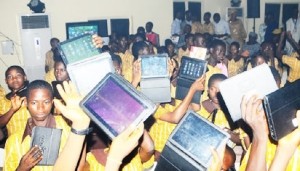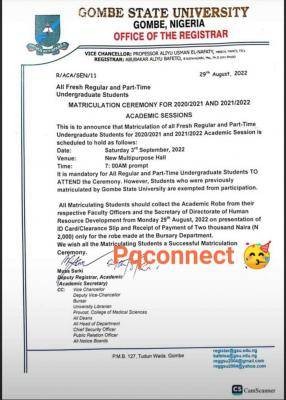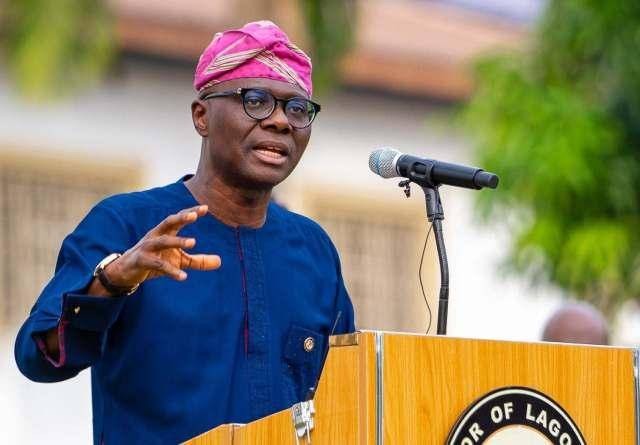
As students trooped back to class following the end of the six-month academic strike at public universities in Nigeria, lecturers put monitoring and implementation committees in place to ensure the disbursement and judicious use of special intervention funds aimed at gradually erasing infrastructural decay on campuses.
They are also investigating ways to best implement other clauses in the strike-busting agreement reached between Nigeria’s federal government and the Academic Staff Union of Universities, or ASUU, on 12 December 2013.
There are indications that university authorities are willing to cooperate and abide by guidelines on ways the agreement could improve living and teaching conditions on campuses.
While students are eager to resume studies, academics have two main objectives on their minds – to resume teaching, and to keep an eagle eye on implementation of the memorandum of understanding signed on behalf of government by permanent secretary in the Ministry of Education Dr MacJohn Nwaobiala and ASUU National President Dr Nasir Isa Fagge.
“We must ensure that the spirit and the letter of this agreement must be obeyed by the government and ASUU,” declared Dr Adekunle Idris, ASUU chair at Lagos State University.
The agreement
The memorandum of agreement commits the government to implement a six-year plan to tackle the decay in university infrastructure. For 2013 it deposited US$1.3 billion with the central bank to kick-start the mini ‘Marshall Plan’, and a further around US$1.4 billion will follow each year from 2014-18.
The initial US$1.3 billion is available to be spent by public universities on a quarterly basis as soon as national and local implementation and monitoring committees become operational.
The national implementation monitoring committee will be chaired by the education minister and comprised of representatives of organs of government, committees of vice-chancellors and chancellors, and university-based unions including the ASUU.
Among other things, the agreement states that nobody may be victimized for his or her role in the process leading up to the agreement, and that later this year there will be renegotiation of a key 2009 agreement – the long academic strike was primarily over government’s failure to implement that agreement.
The memorandum further states that the government is willing to engage universities for special consultancy services such as geological and solid mineral surveys, biotechnology, environmental impact assessments, and shelter belt and minerals mapping among other areas, to boost the income-generating base of universities.
Vice-chancellor support
Reports from campuses indicate that the federal and the regional governments have instructed university authorities not to victimizse any lecturers who took part in the six-month industrial action, which paralysed public universities. Vice-chancellors have complied.
It is interesting to note that many of the vice-chancellors have ‘suddenly’ become fervent supporters of better funding for tertiary education, as advocated by ASUU.
Taking a cue from President Goodluck Jonathan and Acting Minister of Education Nyesome Wike, many vice-chancellors now see the current ASUU leaders as dedicated patriots whose actions are aimed at repositioning Nigeria’s universities in the 21st Century.
While recognising its role in rescuing the university system from decline, ASUU’s leadership is not carried away by assessments of its historical duties and responsibilities to the nation-state as reflected in statements credited to government officials and some vice-chancellors.
“The task ahead is enormous. We must remain vigilant and participate actively in the implementation of the recent agreement,” said Femi Shaka, professor of film and cinematography at the University of Port Harcourt.
The union has sent the names of its representatives to the national implementation monitoring committee. It has also instructed local branches to take an active part in the selection of members of the implementation and monitoring committees in each university.
The committees will be crucial to the success or failure of the agreement. They will propose, execute and monitor projects for which funds are disbursed from federal government.
The committees will send reports on projects to the central committee, which has been mandated to release tranches of funds to universities only on the basis of reports submitted by local committees. No university will be entitled to funding if it does not show how previous funds have been spent.
Possible points of disagreement
Observers have been quick to point out two salient points in the agreement that may be a source of future disagreement between the government and the ASUU.
The first point is in the area of internally generated funds.
“The MOU specifically states that government is willing to engage the services of universities so that it can help improve on their internally generated funds. This portion of the agreement is loose and not legally binding,” said Adijat Momodu, an expert on industrial disputes.
“ASUU should renegotiate with government so that a given percentage of consultancy and research funds in each ministry is deliberately set aside for universities for specific government funded projects. This model will help in the funding of research in universities.
“Right now, consultancy and research funds in government agencies are given out as patronage to political friends of those in power. This practice can only change if ASUU takes another look at this aspect of the agreement,” Momodu warned.
The second area of concern in the agreement is that government is committed to finding lasting solutions to the challenges facing university education through the development of various strategies “within the revenue profile of government”.
In other words, the government can only guarantee funding of public university education on the basis of the funds at its disposal.
Stephen Nwankwo, a banker, cautioned the ASUU to be wary of this clause. He pointed out that with the privatisation of public utilities in the areas of electricity, telecommunications, oil and gas, there were reduced revenues going into government coffers.
“ASUU should insist that government should gradually increase funding of education, at all levels, to at least 26 per cent of its annual budget in line with the recommendation of UNESCO. Nigeria is one of the signatories to the UNESCO formula,” Nwankwo said.
Ibrahim Biu, a sociology student at the University of Jos in Plateau state, said: “The battle to rescue public university education in Nigeria has just begun.”



